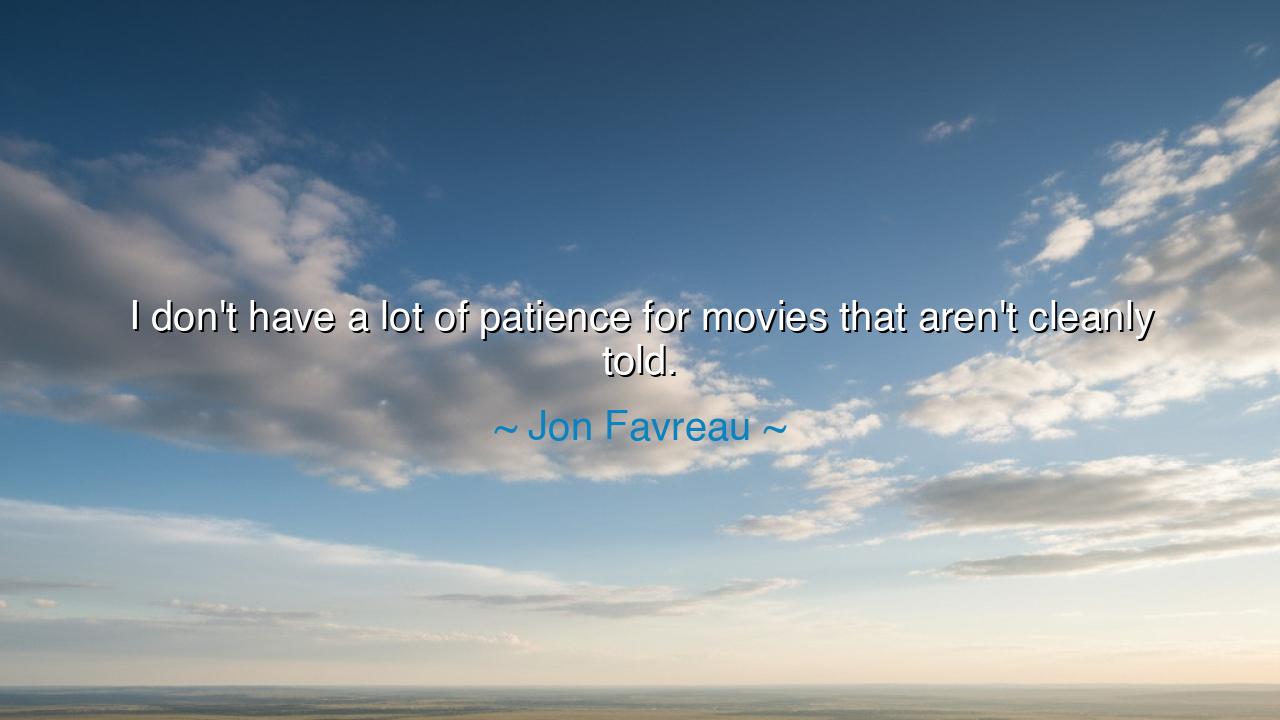
I don't have a lot of patience for movies that aren't cleanly






Jon Favreau, the craftsman of cinema and storyteller of both humor and heroism, once declared: “I don’t have a lot of patience for movies that aren’t cleanly told.” Though these words arise from the world of film, they carry the weight of an ancient principle: that clarity in storytelling is not merely a technique, but a virtue. To tell a tale well is to honor the audience, to respect their attention, and to bind them in the shared spell of narrative. To tell it poorly, with confusion or excess, is to betray both story and listener.
Favreau speaks here to the heart of all art: the need for clean storytelling. A story must have purpose, rhythm, and focus. Like a river that flows strongly to the sea, it must carry its listeners forward without meandering into swampy tangles. The audience comes not to be lost in disorder, but to be guided with care through worlds of wonder, sorrow, or triumph. In saying he has little patience for the unclear, Favreau aligns himself with the ancient keepers of oral tradition, who knew that the power of a story rests not in how many words are spoken, but in how directly they strike the heart.
Consider the ancient bards of Greece, who sang the Iliad and the Odyssey across generations. Their tales, though vast, were cleanly told—each verse woven with purpose, each digression serving meaning. For centuries, audiences gathered by firelight and hearth to hear them, never doubting where the tale would carry them. This is the power of clarity. In contrast, stories that wander without aim are quickly forgotten, for the human mind craves structure, and the human heart longs for resolution.
Favreau, as a filmmaker, reminds us that patience is finite, both for the teller and the listener. Just as a commander cannot afford a battle plan without clear orders, and a teacher cannot afford lessons without coherence, so too can a storyteller not afford confusion. When a film wastes time with chaos instead of guidance, the bond between creator and audience weakens. For the true storyteller is not performing for himself, but serving as a bridge between vision and those who receive it.
This principle finds echo in history’s greatest speeches. When Abraham Lincoln rose at Gettysburg, he spoke for but a few minutes. His words were few, but they were clear, cutting through grief and uncertainty to proclaim a vision of freedom. His speech endures not for its length, but for its precision and purpose. In the same way, Favreau’s demand for clarity in movies echoes this truth: brevity and cleanliness often achieve more than length and excess.
Yet we must also recognize that clarity requires discipline. It is easier to ramble than to refine, easier to add than to strip away. The clean story emerges not from laziness, but from relentless labor. Writers, poets, and filmmakers alike must endure the fire of editing, shaping their work again and again until only what is true and essential remains. Favreau’s impatience with untidy stories is, in truth, a call to higher standards—a demand that creators honor their craft and their audience with discipline.
The lesson, O seekers of wisdom, is plain: in your own lives, in your speech, in your work, and in your art, pursue clarity. Do not burden others with confusion when you can guide them with purpose. Cultivate the discipline to refine your words, your actions, and your vision, until they shine without excess. Remember that the clean story, like the straight path, carries others forward with strength. And when your tale is told—whether through film, through writing, or through the daily choices of your life—let it be clean, let it be clear, and let it endure.






AAdministratorAdministrator
Welcome, honored guests. Please leave a comment, we will respond soon